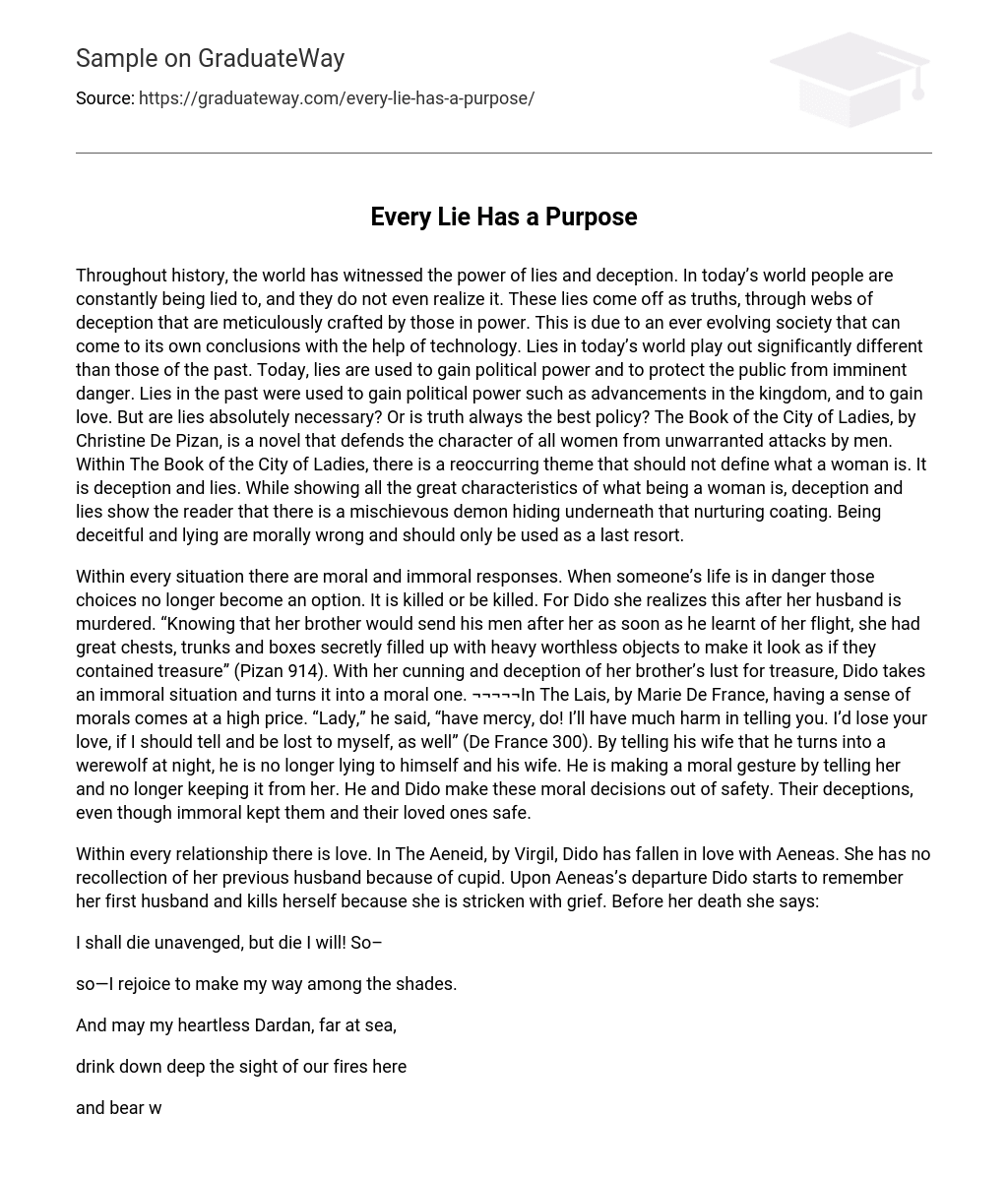Throughout history, the world has witnessed the power of lies and deception. In today’s world people are constantly being lied to, and they do not even realize it. These lies come off as truths, through webs of deception that are meticulously crafted by those in power. This is due to an ever evolving society that can come to its own conclusions with the help of technology. Lies in today’s world play out significantly different than those of the past. Today, lies are used to gain political power and to protect the public from imminent danger. Lies in the past were used to gain political power such as advancements in the kingdom, and to gain love. But are lies absolutely necessary? Or is truth always the best policy? The Book of the City of Ladies, by Christine De Pizan, is a novel that defends the character of all women from unwarranted attacks by men. Within The Book of the City of Ladies, there is a reoccurring theme that should not define what a woman is. It is deception and lies. While showing all the great characteristics of what being a woman is, deception and lies show the reader that there is a mischievous demon hiding underneath that nurturing coating. Being deceitful and lying are morally wrong and should only be used as a last resort.
Within every situation there are moral and immoral responses. When someone’s life is in danger those choices no longer become an option. It is killed or be killed. For Dido she realizes this after her husband is murdered. “Knowing that her brother would send his men after her as soon as he learnt of her flight, she had great chests, trunks and boxes secretly filled up with heavy worthless objects to make it look as if they contained treasure” (Pizan 914). With her cunning and deception of her brother’s lust for treasure, Dido takes an immoral situation and turns it into a moral one. ¬¬¬¬¬In The Lais, by Marie De France, having a sense of morals comes at a high price. “Lady,” he said, “have mercy, do! I’ll have much harm in telling you. I’d lose your love, if I should tell and be lost to myself, as well” (De France 300). By telling his wife that he turns into a werewolf at night, he is no longer lying to himself and his wife. He is making a moral gesture by telling her and no longer keeping it from her. He and Dido make these moral decisions out of safety. Their deceptions, even though immoral kept them and their loved ones safe.
Within every relationship there is love. In The Aeneid, by Virgil, Dido has fallen in love with Aeneas. She has no recollection of her previous husband because of cupid. Upon Aeneas’s departure Dido starts to remember her first husband and kills herself because she is stricken with grief. Before her death she says:
I shall die unavenged, but die I will! So–
so—I rejoice to make my way among the shades.
And may my heartless Dardan, far at sea,
drink down deep the sight of our fires here
and bear with him this omen of our death! (Virgil 988)
After Aeneas’s departure Dido feels almost as if she has been lying to herself. Cupid’s deception of her makes her go over the edge. Just like Dido, the Bisclavret also goes over the edge. He goes over the edge because his wife had run off with another man. When he sees his wife after a very long time, “He tore her nose off, then and there” (De France 304). The Bisclavret does this because his wife has been deceitful towards him. She has fallen in love with another man and has taken away his clothes. Her love for the other man means so much to her that she would imprison her husband as a Werewolf. Just like cupid, the wife lies in order to get what she wants.
Revenge is good to those who wait. After escaping her brother wrath, Dido uses her deception to build a small colony for herself and her followers. De Pizan says, “Those who had sold her the land were amazed and stunned by her cunning ruse, yet they had to abide by the deal they had struck with her” (915). She used her deception and cunning to stretch out her plot of land which turned into a great city. Dido’s use of deception makes her and her city bigger than her brother, the king. She had gotten revenge on him for killing her husband. Even though her deception of him was immoral, her city that she had built, helped many people. Just like Dido’s brother, the king, the Bisclavret’s wife was banished with her new lover. The deception and lies that she committed against her husband were immoral, but were justified. De France says, “numbers of women of her race –it’s true–were born without a nose” (305). Both Dido and the Bisclavret got revenge on those who had wronged them. Their methods moral or immoral made them better people.
Lying and deceiving people is a very dangerous game. It worked out for Dido but didn’t work out for the Bisclavret’s wife. Lying is immoral and should not be used. There are many instances were lying works, but in the end someone always gets caught. It is just better to tell the truth no matter the consequences. Lying does not justify the means in the end. The truth is always the best policy.





